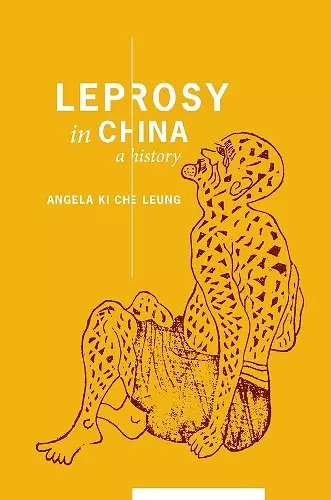Leprosy in China
A History
Format:Hardback
Publisher:Columbia University Press
Published:23rd Jan '09
Currently unavailable, and unfortunately no date known when it will be back

Building on her complex history of the conception and treatment of leprosy in China, Angela Ki Che Leung offers an enlightening examination of the social history of the disease, especially its unique role in the stigmatization of Chinese and other Asians as preternaturally sickly races, which led to campaigns to eradicate the disease through modern drug therapies. In terms of both its historical breadth and its deep research, this fascinating study stands as one of the finest contributions to the history of medicine in China. -- Richard von Glahn, professor of history, University of California, Los Angeles Leprosy in China is a monumental work crafted by the top scholar in the field of the social and cultural history of Chinese medicine. Truly comprehensive, complex, and sophisticated, this book is the definitive study of one of the most symbolically important diseases in world history. It already stands as the only comprehensive book on a single disease in Chinese history available in English. As such, Leprosy in China sets the stage for a new direction in Asian medical history. -- Ruth Rogaski, associate professor of history, Vanderbilt University In this fascinating contribution, Angela Ki Che Leung vividly traces the biography of leprosy in China, a horrifying malady that organized perceptions of human difference and civic status within the region. Its dreadful career thus provides fresh insight into the bodily dimensions and redemptive tone of Chinese nationalism and state building. -- Warwick H. Anderson, University of Sydney Leprosy in China is a major work by one of our finest historians of the social history of medicine. The medieval story of leprosy as seen through religion, medicine, and folklore will attract East-West comparativists interested in the deep history of medicine and culture. The modern nineteenth- and twentieth-century story places China at the center of the worldwide public health crisis over leprosy-a crisis shaped as much by ancient fears and anxieties of empire as by scientific innovation. This book will be essential reading for all who care about a truly global, postcolonial, and critical history of public health. -- Charlotte Furth, University of Southern California
Angela Ki Che Leung's meticulous study begins with the classical annals of the imperial era, which contain the first descriptions of a feared and stigmatized disorder modern researchers now identify as leprosy. She then tracks the relationship between the disease and China's social and political spheres (theories of contagion prompted community and statewide efforts at segregation); religious traditions (Buddhism and Daoism ascribed redemptive meaning to those suffering from the disease), and evolving medical discourse (Chinese doctors have contested the disease's etiology for centuries). Leprosy even pops up in Chinese folklore, attributing the spread of the contagion to contact with immoral women. Leung next places the history of leprosy into a global context of colonialism, racial politics, and "imperial danger." A perceived global pandemic in the late nineteenth century seemed to confirm Westerners' fears that Chinese immigration threatened public health. Therefore battling to contain, if not eliminate, the disease became a central mission of the modernizing, state-building projects of the late Qing empire, the nationalist government of the first half of the twentieth century, and the People's Republic of China. Stamping out the curse of leprosy was the first step toward achieving "hygienic modernity" and erasing the cultural and economic backwardness associated with the disease. Leung's final move connects China's experience with leprosy to a larger history of public health and biomedical regimes of power, exploring the cultural and political implications of China's Sino-Western approach to the disease.
A fascinating and detailed history of leprosy in China. -- Daniel Scott Missiology Highly Recommended. Choice What makes Leung's book important and demonstrates why disease histories should be written are the consequences which develop far beyond the medical - consequences that reach into the social, economic, and the political domains of a state, and perhaps spill over into world concern and judgement, not just of the state but of its people. -- Ruth L. Meserve Journal of Asian History Highly recommended for historians of China and of medicine -- David Luesink Pacific Affairs Leung's complex work stands among the most important books on Chinese medical history... Leprosy in China is a solid piece of scholarship that re-orients the historiography of East Asian medicine in sophisticated ways. Medical History
ISBN: 9780231123006
Dimensions: unknown
Weight: unknown
392 pages